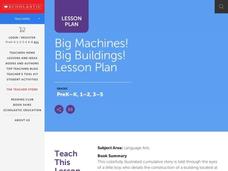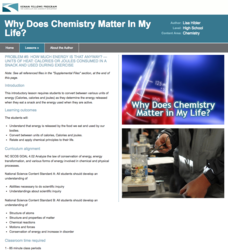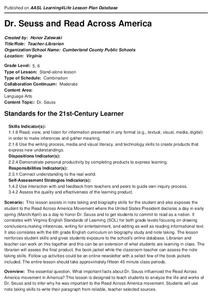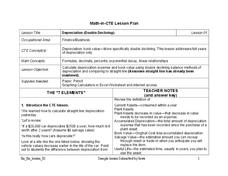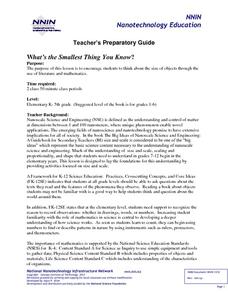Curated OER
Marine Life, Oceans, Lakes and Rivers
Students examine the types of organisms found in oceans. In groups, they read articles about the research done at certain sites. They work together to research their own water ecosystems and report the findings to the class. To end...
Curated OER
Career Exploration
Students investigate possible career paths in forestry they may pursue. In this vocational lesson plan, students discover the many careers possible in the world of science by researching teacher approved career websites on the Internet....
Curated OER
Native Planting for the Built or Green Environment
Students identify the terms used in naturescaping. They identify how to plant, how to do site preparation and how to develop a plan. Students explore the benefits of naturescaping for the health of the environment. They also...
Curated OER
Exploring Space Fact
Learners visit web sites to gather information about space and space exploration.
Curated OER
Careers in Film
Middle schoolers discuss the difference between independent films and and films produced by a major studio. They select an independent filmmaker to research and begin their research from a list of given Web sites. When research is...
Curated OER
Earths Waters
Middle schoolers research Everglades National Park, Three Gorges Dam, Hoover Dam, Roaring 40s, and Mariana Trench. After reviewing the sites, they choose one to illustrate a postcard with an image on one side and a description of the...
Curated OER
An Internet Activity for The Introduction Of The Civil War
Students research, using the Internet, specified Civil War battles in order to prepare an oral presentation for the class. They, in small groups, present using images and maps. They take a quiz on the subject matter and evaluate the web...
Curated OER
Take Me To Your National Park
Young scholars describe the purposes of national parks as a part of our American heritage. They identify and describe important national park sites in a specific state. They write a journal entry or paragraph about why national parks...
Curated OER
Ants
Third graders study the habits and habitats of ants. They research the use of technology as a valuable investigation tool and access other web sites for future research projects. The students make successful decisions while playing SimAnt.
Curated OER
Big Machines! Big Buildings! Lesson Plan
Students read a book and understand the cumulative events of the story through sequencing. In this lesson about cumulative texts, students are able to read the story and understand the sequence of the events. Students listen to the...
Curated OER
Space Telescope Debate
Students investigate the Hubble and Webb telescopes. In this space telescope lesson, students research Internet sites to find out what type of information these telescopes provide. They debate whether it is financially responsible to...
Curated OER
Sports Science
Young scholars explore athletes and how they perform. In this physics lesson, students investigate how physics is involved in sports. Young scholars go online to interactive sites that explain physics and biomechanics. Students also...
Curated OER
Persona Interests, Likes, and Dislikes
Students practice listening to and discussing their personal interests and opinions. In this communication lesson, students listen as the teacher talks about his/her personal interest. They work with a partner to verbally share their own...
Curated OER
Baltimore as a Port of Entry
Fourth graders explore the Port of Baltimore. In this European immigration to America instructional activity, 4th graders investigate the port as port of entry between 1830 and 1850. Students examine primary documents from selected Web...
Curated OER
Greek Barbie or Action Figure
Young historians bring Greek mythology to the twenty-first century with this engaging research project. Hired to create a Barbie doll or action figure modeled after a Greek god or goddess, students gather the information necessary to...
EngageNY
Modeling an Invasive Species Population
Context makes everything better! Groups use real data to create models and make predictions. Classmates compare an exponential model to a linear model, then consider the real-life implications.
Kenan Fellows
How Much Energy Is That Anyway?
The fifth lesson in the six part series introduces units of energy including calories, Calories, and joules. Scholars determine the energy released when eating a snack and during activity.
Curated OER
St. Patrick’s Day
Combine math, creative writing, and leprechauns in a fun St. Patrick's Day activity! Using a bag of gold coins and marshmallows, kids write a math story about a leprechaun that includes a multi-step equation to solve.
Newseum
Are You a Publisher?: Free Press and You
What kinds of media do your pupils use to read and publish information? After a discussion about what publishing means, and about the freedom of the press, class members interview one or two other people about their publishing habits....
Curated OER
Dr. Seuss and Read Across America
What important facts about Dr. Seuss influenced the Read Across America movement...? This is the driving question of a research project that requires scholars to find information about Dr. Seuss' life and work. Class members write a...
Cornell University
Nano Interactions
Tiny particles can provide big learning opportunities! Middle school scientists explore the world of nanoparticles through reading, discussion, and experiment. Collaborative groups first apply nanotechnology to determine water hardness....
Cornell University
Chemical Reactions
Investigate the Law of Conservation of Mass through a lab exploration. Individuals combine materials to initiate chemical reactions. They monitor for signs of reactions and measure the masses before and after the reactions for comparison.
National Research Center for Career and Technical Education
Depreciation (Double Declining)
Have you ever been told that your new car begins to lose its value as soon as you drive it off the lot? Aspiring accountants take on the concepts of depreciation and book value through an easy-to-deliver career and technology lesson. The...
National Nanotechnology Infrastructure Network
What’s the Smallest Thing You Know?
Elementary learners listen to a story, then sort objects from largest to smallest at six different stations around the classroom. Adaptable for a large range of age and ability groups.











